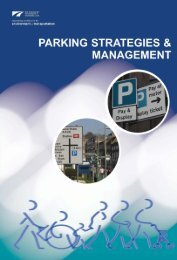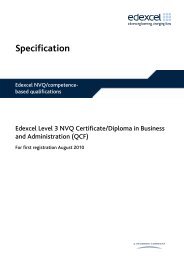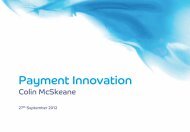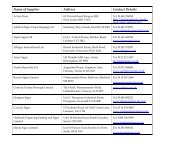Level 2 and 3 Diploma in Business Support (4475-12/13)
Level 2 and 3 Diploma in Business Support (4475-12/13)
Level 2 and 3 Diploma in Business Support (4475-12/13)
Create successful ePaper yourself
Turn your PDF publications into a flip-book with our unique Google optimized e-Paper software.
• meet<strong>in</strong>g deadl<strong>in</strong>es <strong>and</strong> targets<br />
• motivation<br />
• shar<strong>in</strong>g workloads<br />
• support <strong>and</strong> advice.<br />
Outcome 5 Know how to plan own work <strong>and</strong> be accountable to others<br />
1. The importance of hav<strong>in</strong>g a flexible approach to work requirements <strong>and</strong> know<strong>in</strong>g how to<br />
prioritise <strong>and</strong> plan pieces of work accord<strong>in</strong>g to their urgency eg us<strong>in</strong>g SMART objectives. The<br />
c<strong>and</strong>idate should be able to describe circumstances when deadl<strong>in</strong>es cannot be met through, eg:<br />
• <strong>in</strong>terruptions<br />
• distractions<br />
• tak<strong>in</strong>g on extra work<br />
• staff absence<br />
• technical breakdown<br />
• unforeseen circumstances such as <strong>in</strong>clement weather, transport strikes.<br />
The c<strong>and</strong>idate should be aware of the impact of not meet<strong>in</strong>g deadl<strong>in</strong>es on:<br />
• their colleagues<br />
• their manager/supervisor<br />
• the organisation as a whole.<br />
2. Techniques to prioritise <strong>and</strong> plan own workload, eg:<br />
• diaries<br />
• schedulers<br />
• planners<br />
• organisers/PDAs<br />
• timesheets<br />
• to do lists.<br />
3. Ways of progress report<strong>in</strong>g may be through, eg:<br />
• regular progress reports<br />
• one-to-one update meet<strong>in</strong>gs<br />
• progress/team meet<strong>in</strong>gs<br />
• shared project planners.<br />
The c<strong>and</strong>idate should be able to state advantages/disadvantages of different ways <strong>and</strong> when<br />
they would be most appropriate to use.<br />
Outcome 6 Underst<strong>and</strong> the purpose of improv<strong>in</strong>g own performance <strong>in</strong> a<br />
bus<strong>in</strong>ess environment <strong>and</strong> how to do so<br />
1. Benefits that result from cont<strong>in</strong>uously improv<strong>in</strong>g own performance, eg<br />
• opportunity to improve weaknesses <strong>and</strong> ga<strong>in</strong> new skills<br />
• motivational<br />
• <strong>in</strong>creased ability to embrace changes/challenges<br />
• possible f<strong>in</strong>ancial reward/promotion<br />
• <strong>in</strong>creased employability.<br />
2. Methods of assess<strong>in</strong>g own performance, eg SWOT analysis; how observation <strong>and</strong> feedback,<br />
tra<strong>in</strong><strong>in</strong>g needs analyses (TNA), one-to-one meet<strong>in</strong>gs/ appraisal <strong>and</strong> performance reviews can all<br />
feed <strong>in</strong>to a Personal Development Plan. The c<strong>and</strong>idate should be able to expla<strong>in</strong> the purpose of<br />
<strong>Level</strong> 2 <strong>and</strong> 3 <strong>Diploma</strong> <strong>in</strong> Bus<strong>in</strong>ess <strong>Support</strong> (<strong>4475</strong>-<strong>12</strong>/<strong>13</strong>) 55







